Daily Vocabulary Words: List of Daily Used Words
Hi there. Welcome to this special section @ Wordpandit.
Our endeavour here is straightforward: highlighting important daily vocabulary words, you would encounter in The Hindu. This is your repository of commonly used words; essentially, we are posting a list of daily used words. Hence, this has significant practical application as it teaches you words that are commonly used in a leading publication such as The Hindu.
Visit the website daily to learn words from The Hindu.
WORD-1: Demarcated
CONTEXT: The U.K. and the EU then drew up fresh rules, called the Windsor Framework, which stated that on arrival at the border of Northern Ireland, goods will be demarcated into two.
SOURCE: The Hindu
EXPLANATORY PARAGRAPH: Imagine drawing a line in the sand to show where your sandcastle area starts and where it ends. Demarcated means marking the boundaries or limits of something, just like that line in the sand shows what part is yours.
MEANING: Set the boundaries or limits of something clearly (verb).
PRONUNCIATION: dee-MAR-kay-ted
SYNONYMS: delineated, defined, separated, distinguished, marked, bordered, outlined
USAGE EXAMPLE:
1. The nature reserve is clearly demarcated from the surrounding areas.
2. The two countries demarcated their border with a fence.
3. They demarcated the different zones of the city for administrative purposes.
4. The parking spaces were demarcated by white lines.
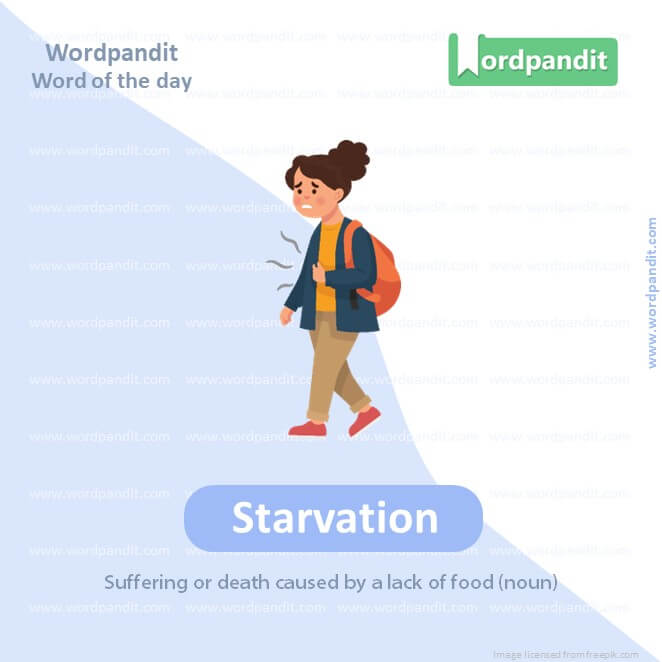
WORD-2: Starvation
CONTEXT: The growing resistance against the colonial English rule, especially after the Potato Famine of 1845 where over 1 million Irish people died due to disease and starvation, cemented these sectarian and religious differences.
SOURCE: The Hindu
EXPLANATORY PARAGRAPH: Imagine if you had a plant but forgot to give it water, and it started to look sad and droopy because it was very thirsty. Starvation is when someone or something doesn’t get enough food to eat and feels very weak and hungry.
MEANING: Suffering or death caused by a lack of food (noun).
PRONUNCIATION: star-VAY-shun
SYNONYMS: famine, hunger, malnutrition, undernourishment, famishment, starvation
USAGE EXAMPLE:
1. The prolonged drought led to widespread starvation in the region.
2. Aid organizations are working to prevent starvation in the refugee camps.
3. The animal died of starvation.
4. Measures were taken to alleviate starvation among the poorest communities.
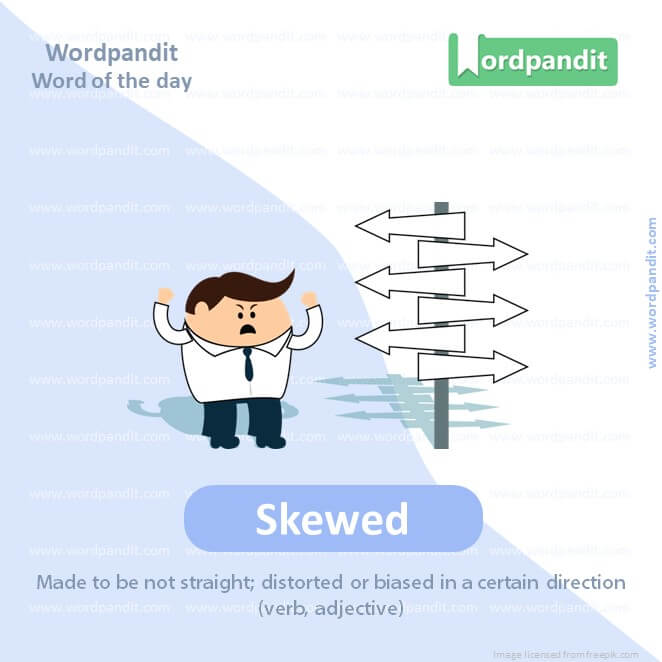
WORD-3: Skewed
CONTEXT: Moreover, there have also been claims that elections were heavily skewed towards the Unionists due to gerrymandering practices.
SOURCE: The Hindu
EXPLANATORY PARAGRAPH: Imagine you’re trying to build a tower with blocks, but instead of putting them straight, you stack them a little to the side so your tower looks slanted. Skewed means something that’s not straight or even; it’s twisted or turned to one side, just like your slanted block tower.
MEANING: Made to be not straight; distorted or biased in a certain direction (verb, adjective).
PRONUNCIATION: skewd
SYNONYMS: distorted, biased, slanted, angled, tilted, warped, misaligned
USAGE EXAMPLE:
1. The survey results were skewed by the way the questions were asked.
2. The accident skewed the car’s alignment.
3. His judgment was skewed by his personal feelings.
4. The distribution of wealth in the country is heavily skewed.
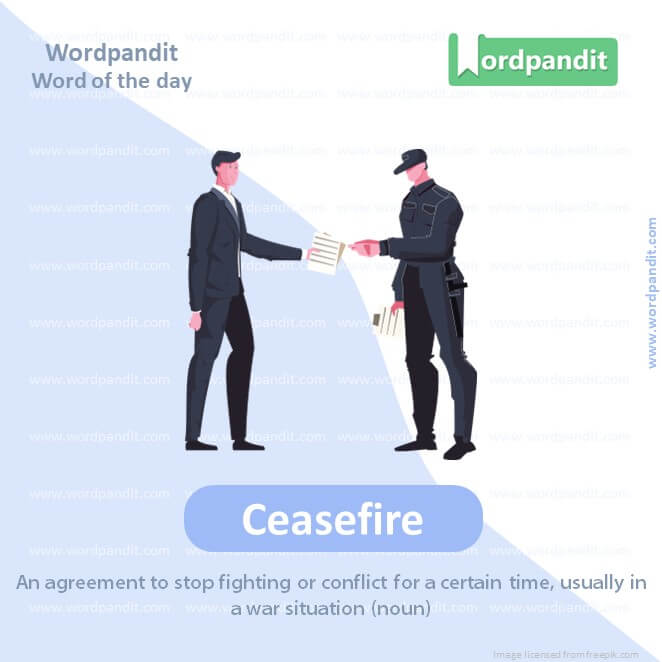
WORD-4: Ceasefire
CONTEXT: Israeli Prime Minister Benjamin Netanyahu has rejected Hamas demands for a ceasefire and vowed to press ahead with Israel’s military offensive in Gaza until achieving “absolute victory.”
SOURCE: The Hindu
EXPLANATORY PARAGRAPH: Imagine two groups of friends who are arguing and decide to take a break and stop arguing for a while to cool down. A ceasefire is like that break—it’s an agreement to stop fighting or arguing for a period of time, so everyone can calm down or work out a solution.
MEANING: An agreement to stop fighting or conflict for a certain time, usually in a war situation (noun).
PRONUNCIATION: SEEZ-fy-er
SYNONYMS: truce, armistice, peace, suspension, halt, pause, standstill
USAGE EXAMPLE:
1. The two countries agreed to a ceasefire to allow humanitarian aid.
2. The ceasefire was broken after just a few hours.
3. Negotiations are underway to extend the ceasefire.
4. The ceasefire allowed displaced families to return home temporarily.
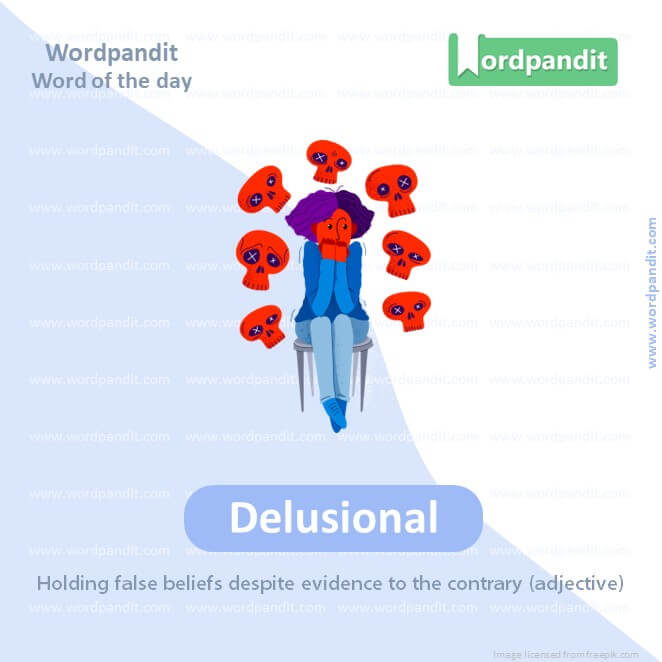
WORD-5: Delusional
CONTEXT: Israeli Prime Minister Benjamin Netanyahu on February 7 rejected Hamas’ terms for a ceasefire and hostage-release agreement, calling them “delusional,” a position that complicates efforts to strike a deal between the sides.
SOURCE: The Hindu
EXPLANATORY PARAGRAPH: Imagine believing you could jump super high, like over your house, even though it’s not possible for people to do that. Being delusional means thinking something is true when it’s not, like believing in something that’s just make-believe or not real.
MEANING: Holding false beliefs despite evidence to the contrary (adjective).
PRONUNCIATION: deh-LOO-zhuh-nuhl
SYNONYMS: unrealistic, mistaken, irrational, fanciful, misguided, erroneous, false
USAGE EXAMPLE:
1. He was delusional in thinking he could win without any effort.
2. The patient had delusional beliefs about being a famous celebrity.
3. Her delusional optimism kept her from seeing the truth.
4. They had to deal with his delusional accusations calmly.
WORD-6: Homogenous
CONTEXT: Cannot treat Scheduled Castes as a homogenous group: Supreme Court
SOURCE: The Hindu
EXPLANATORY PARAGRAPH: Imagine making a smoothie where you blend all the fruits together until it’s all one smooth mix. Homogenous means everything is the same or very similar throughout, just like your smoothie is all mixed up so everything in it is blended together evenly.
MEANING: Consisting of parts or elements that are all the same or similar (adjective).
PRONUNCIATION: ho-MOJ-uh-nus
SYNONYMS: uniform, similar, identical, alike, consistent, undifferentiated, congruent
USAGE EXAMPLE:
1. The team was homogenous, with members sharing similar backgrounds.
2. The mixture needs to be homogenous, with no lumps.
3. A homogenous society may have less conflict but also less diversity.
4. The product’s quality was inconsistent because the material was not homogenous.
WORD-7: Underprivileged
CONTEXT: A seven-judge Constitution Bench headed by Chief Justice of India D.Y. Chandrachud on Tuesday observed that Scheduled Castes cannot be treated as a “homogenous group” for granting reservation as some may have advanced in society while other continue to remain “particularly underprivileged”.
SOURCE: The Hindu
EXPLANATORY PARAGRAPH: Imagine some kids at school don’t have as many toys or books as others, or maybe they can’t afford to go on field trips. Being underprivileged means not having as many opportunities or things as other people, making things a bit harder for them.
MEANING: Lacking the same opportunities, rights, and services as other members of society (adjective).
PRONUNCIATION: un-der-PRIV-uh-lijd
SYNONYMS: disadvantaged, impoverished, needy, poor, deprived, destitute, disadvantaged.
USAGE EXAMPLE:
1. Programs were established to help underprivileged children access education.
2. She came from an underprivileged background but worked her way to success.
3. The charity focuses on supporting underprivileged communities.
4. The initiative aims to level the playing field for underprivileged students.
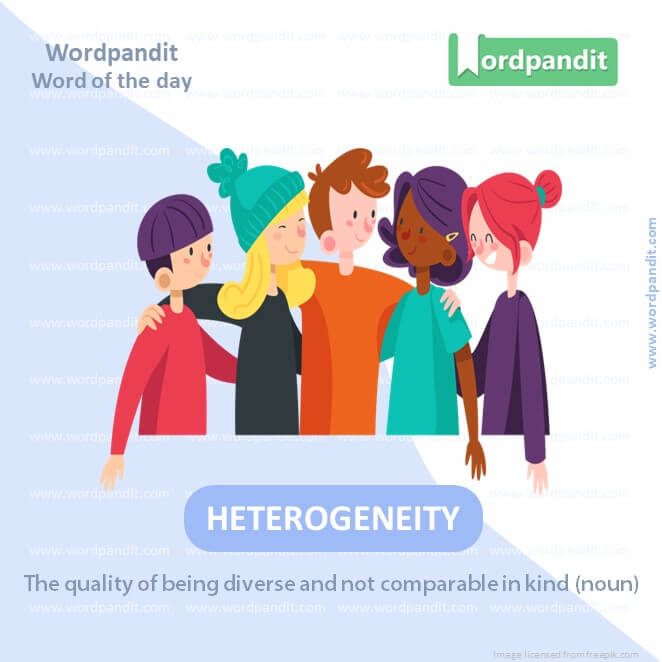
WORD-8: Heterogeneity
CONTEXT: The heterogeneity is clear from the Presidential list itself,” senior advocate Kapil Sibal, for a petitioner, highlighted.
SOURCE: The Hindu
EXPLANATORY PARAGRAPH: Imagine a box filled with all sorts of toys—some are cars, some are dolls, and others are building blocks. Heterogeneity is like that box of toys, meaning there are lots of different kinds or varieties of things all mixed together.
MEANING: The quality of being diverse and not comparable in kind (noun).
PRONUNCIATION: het-er-oh-jee-NEE-uh-tee
SYNONYMS: diversity, variety, dissimilarity, disparity, difference, divergence, variation
USAGE EXAMPLE:
1. The study highlighted the heterogeneity of the patient population.
2. Heterogeneity in classroom teaching methods can address different learning styles.
3. The cultural heterogeneity of the city is one of its most cherished aspects.
4. The heterogeneity of opinions in the debate made it particularly interesting.
WORD-9: Mischievous
CONTEXT: Nirmala Sitharaman says Karnataka’s charges about inadequate tax devolutions mischievous; government has followed Fifteenth Finance Commission’s recommendations on tax sharing
SOURCE: The Hindu
EXPLANATORY PARAGRAPH: Imagine someone playing a harmless prank, like putting a whoopee cushion on a chair. Mischievous means liking to play pranks or have fun in a playful or naughty way, without intending to cause serious harm.
MEANING: Fond of or causing playful trouble or harm (adjective).
PRONUNCIATION: MIS-chuh-vus
SYNONYMS: playful, naughty, impish, roguish, cheeky, puckish, prankish
USAGE EXAMPLE:
1. The mischievous child hid his sister’s toy.
2. Her mischievous smile hinted at her playful plan.
3. The mischievous puppy had chewed up all the shoes.
4. He concocted a mischievous scheme to surprise his friends.
WORD-10: Faction
CONTEXT: The Election Commission has approved a new name — the ‘Nationalist Congress Party-Sharadchandra Pawar’ — for NCP chief Sharad Pawar’s faction a day after it awarded the party’s original name and clock symbol to the rival NCP faction headed by Mr. Pawar’s nephew and Maharashtra Deputy CM Ajit Pawar.
SOURCE: The Hindu
EXPLANATORY PARAGRAPH: Imagine your class is divided into groups for a big game. Each group wants to win and has its own plan or idea on how to do it. A faction is like one of those groups, especially when they have strong opinions or ideas that might not match with the others.
MEANING: A small, organized, dissenting group within a larger one, especially in politics (noun).
PRONUNCIATION: FAK-shun
SYNONYMS: group, clique, sect, wing, bloc, splinter group, camp
USAGE EXAMPLE:
1. The political party was split into several factions.
2. A faction within the organization was pushing for radical changes.
3. The leader tried to unite the various factions.
4. Factions within the community had differing views on the development.
vocabulary learning techniques
The gift of language lies not just in the syntax or grammar but majorly thrives on a rich repository of words- the vocabulary. Hence, the importance of vocabulary learning techniques is monumental in language acquisition. These techniques act as catalysts, accelerating the process of language learning, and seamlessly integrating new words into our daily discourse.
The first vital point in mastering vocabulary learning techniques is understanding its purpose. These strategies not just help one in memorizing an array of new words, but also assist in using them appropriately in different contexts. It broadens communication skills and creates a roadmap to better expression of thoughts and ideas.
One of the most commonly employed and impactful vocabulary learning techniques is the usage of flashcards. Flashcards offer visual stimulus which aids in imprinting the word and its meaning more effectively in our minds. Regular practice with flashcards helps cultivate language fluency over time.
Another crucial technique is to learn words in context. This simply means learning a word by associating it with a particular sentence, paragraph or story. This context-based approach remarkably boosts our understanding of the nuanced use of vocabulary in varying scenarios.
Moreover, incorporating digital tools or language learning apps can be an effective method in our vocabulary learning techniques kit. These platforms provide interactive learning experiences with gamified vocabulary exercises, making the learning process greatly enjoyable and engaging.
Finally, regular revision is a cornerstone of these vocabulary learning techniques. Repeated revisions ensure that the learned words do not slip away and rather, become firmly anchored in our memory.
Indeed, vocabulary learning techniques are much more than mere memorization strategies. They nurture linguistic competence, expanding expressive capabilities and fostering effective communication. Hence, investing time in understanding and practicing these vocabulary learning techniques can pay rich dividends in enhancing one’s language proficiency.













